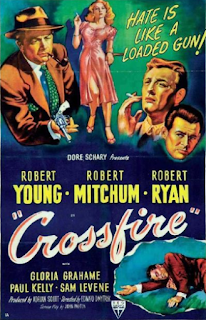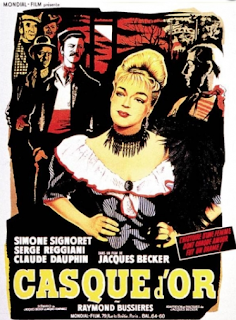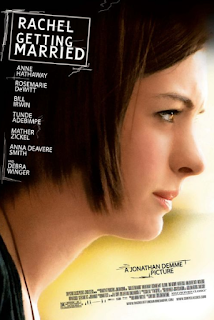Crossfire (1947)
Crossfire is an interesting movie for two reasons: the first one is that it is the first B movie to receive an Oscar nomination for Best Picture; the second one is that it is a social message film and a noir thriller at the same time. Nowadays, it's a rarely remembered movie but to be fair a certain importance should be acknowledged to it, because it is an example of how a relatively low-budget film can still be stylistically and aesthetically remarkable and also because of its attempt to treat a socially significant matter within the story of a murder mystery. That said, it's not a movie that achieves everything it sets out for itself and it's also one that has clearly suffered from the passing of the years. But its ambition is still worthy of praise and respect.
The story begins with the beating and killing of Joseph Samuels (Sam Levene) at the hands of two men in his own apartment. Samuels, a discharged soldier, was a Jew. Police captain Finlay (Robert Young) is called upon to solve the case and he suspects that the murderer might be among a group of demobilized soldiers with whom Samuels had spent the previous evening at a hotel bar. As his investigation progresses, Finlay comes to realize that the motive behind the assassination might be linked to racial prejudice.
As a thriller, the movie is only half a success, as the murderer is pretty easy to guess right from the beginning. The lack of mystery and true tension is partly made up by Edward Dmytryk's fairly strong direction, which grants the movie a rather atmospheric quality, and J. Roy Hunt's excellent cinematography. As the film is shot using the low-key lighting style, every frame is, for the most part, covered in shadows while only a few characters/details are illuminated: the fact that the focus is always selected and everything else is dark and unidentifiable evokes a feeling of unease and underlying terror that makes the viewing experience more compelling than the story actually is.
The film's greatest hindrance is its screenplay. First off, the plot is at times quite predictable, though Harry Gerstad's editing prevents the movie from becoming dull by presenting the events in a non-linear structure. But the biggest problem is the poor characterization of the characters, who are more stereotypes than actual people. The role of Captain Finlay is an especially paper-thin lead, a character that only serves as a plot device without actually having a life of its own, and Young's rather bland performance does not help either. Robert Mitchum's scarcely gets by thanks to his low-key charm, but he is trapped by the limitations of his generic, one-dimensional role (which the actor himself criticized). Supporting players like George Cooper as a traumatized soldier who is the prime suspect, Jacqueline White as his supportive wife, Steve Brodie as a potential accessory to the crime and Sam Levene as the victim barely make an impact due to the uninspired writing behind their characters. Only two members of the cast truly standout, and they were both deservedly Oscar nominated for their performances: the first one is Robert Ryan, whose ferocious, mesmerizing intensity trascends the one-note nature of his character; the other one is Gloria Grahame, who has the benefit of the only well-written character of the movie and makes the most out of it. Playing Ginny, a tough-talking prostitute who might or might not have an alibi for Cooper's character, Grahame effectively inhabits her brazen behavior while subtly conveying her loneliness and longing for affection. It's a small performance whose running time clocks around 8 minutes, but it's a surprisingly powerful, emotionally resonant one.
In tackling the topic of anti-Semitism, the movie fares a little better than Gentleman's Agreement, the Oscar-winning film from the same year whose script basically revolved around sanctimonious, lifeless speeches. There are some genuinely interesting moments in which the movie depicts the casual racism so integrated into society and the irrationality of the motivations behind it. Unfortunately, towards the end the movie loses its subtlety and gives Captain Finley a needlessly expository, heavy-handed, repetitive monologue about discrimination. This speech has its heart in the right place, but it is ruined by its excessively didactic nature and Young's monotonous delivery. The message of universal acceptance and tolerance is timeless, but its presentation in this movie couldn't be more dated.
Crossfire is not a great noir thriller, it is not a great message film and it just isn't a great movie as a whole. But in spite of its many flaws, it's still a movie that manages to engage its audience and one that tries to defy the notion that a B movie cannot be artistically and socially relevant. Is it a success? Not quite, but it's an admirable attempt.
60/100



Sorry to sound like a broken record, but I have not seen this one.
RispondiEliminaNo worries! I hope I’ll soon review a movie you’ve seen.
EliminaOh, and just to add on a previous question, what would be some of your ratings and thoughts for the supporting actor fields of 2002, 2006 and 2015?
EliminaNewman - 5
EliminaCooper - 4 (though I need a rewatch)
Harris - 3.5
Reilly - 3
Murphy - 4.5
Arkin - 4.5
Wahlberg - 3.5
Stallone - 5
Hardy - 5 (I’m kind of torn about my pick as I really loved them both, as well as Oscar Isaac in Ex Machina and Harvey Keitel in Youth)
Rylance - 4.5
Ruffalo - 2.5
Haven't seen this yet, but i'm very curious to see Grahame, i have heard a lot about her.
RispondiEliminaWhat are your rankings for the fourth and the fifth seasons of American Horror Story?
Grahame's performance is excellent and her nomination wholly earned.
EliminaFreak Show:
1. Jessica Lange - 5
2. Sarah Paulson - 5
3. Finn Wittrock - 5
4. Kathy Bates - 4.5
5. Naomi Grossman - 4.5
6. John Carroll Lynch - 4.5
7. Michael Chiklis - 4.5
8. Angela Bassett - 4
9. Denis O'Hare - 4
10. Grace Gummer - 4
11. Mat Fraser - 4
12. Evan Peters - 4
13. Frances Conroy - 4
14. Neil Patrick Harris - 3
15. Wes Bentley - 2.5
16. Danny Huston - 2
17. Emma Roberts - 2
Hotel:
1. Denis O'Hare - 5
2. Lady Gaga - 4.5
3. Sarah Paulson - 4.5
4. Mare Winningham - 4.5
5. Evan Peters - 4.5
6. Kathy Bates - 4
7. Matt Bomer - 4
8. Chloe Sevigny - 3.5
9. Angela Bassett - 2.5
10. Cheyenne Jackson - 2.5
11. Finn Wittrock - 2
12. Wes Bentley - 2
My ranking for Freak Show would be a bit different:
Elimina1. Lange (5)
2. Wittrock
3. Bates
4. Chiklis
5. Grossman (she's terrific and heartbreaking in the 10th episode!)
6. Lynch (4,5)
7. Conroy
8. Paulson
9. Peters
10. Roberts (4)
11. Bassett
12. Huston
13. Fraser
14. Grummer (3,5)
15. O'Hare (3)
16. Bentley (2,5)
17. Harris (1)
I was not very fond of Emma Roberts' performance. Found her to be rather bland in a potentially intriguing role. And I definitely liked Paulson a lot more then you as I thought she characterized both Bette and Dot beautifully. As for Neil Patrick Harris, I did not found him to be awful as I thought there were some genuinely good moments in there but it was definitely a bit of a mixed bag. As for O'Hare, I did not like him a lot on first viewing but a second rewatch of the season made me appreciate his work far more.
EliminaI'm glad we agree on some of them though, especially Grossman who is indeed devastating in the 10th episode. Her last scene with Lange was heartbreaking.
I definitely disliked everything about Harris and his character. O'Hare is a mixed bag for me, but i think it's a love or hate performance.
EliminaI really liked Roberts, i thoughts was quite charming and she had good chemistry with Peters.
I thought Paulson was terrific but i appreciated other performances more.
I'm rewatching all the seasons of AHS in those weeks so I'll ask you the rankings of the other seasons in the next days :)
I've heard of this one, sounds cool! Also did you see Drew deleted his blog? :(
RispondiEliminaI'd be interested to hear your opinion on it!
EliminaI have to admit I am not familiar with the blog you're mentioning. Which one was it?
Y'know, Fisti?
EliminaOh sure! I did not know his name was Drew. Anyway, that's too bad :( I loved that blog, I found it very interesting and made me discover a lot of performances/films I ended up liking a lot.
EliminaWhat are your top 10 female leading and supporting of 2008? With ratings too.
RispondiEliminaLead:
Elimina1. Sally Hawkins, Happy-Go-Lucky - 4.5 (could be upgraded)
2. Kate Winslet, The Reader - 4.5
3. Meryl Streep, Doubt - 4.5
4. Rebecca Hall, Vicky Cristina Barcelona - 3.5
I have seen Winslet in Revolutionary Road but I should revisit her performance. I loved her the first time I watched it, but then I rewatched some clips and she seemed... awkward. I've also seen the beginning of The Curious Case of Benjamin Button and Blanchett seemed good, but I've never seen the whole film.
Supporting:
1. Marisa Tomei, The Wrestler - 4.5
2. Amy Adams, Doubt - 4.5
3. Viola Davis, Doubt - 4
4. Gwyneth Paltrow, Iron Man - 4
5. Evan Rachel Wood, The Wrestler - 3.5
I did not care for either Johannson or Cruz in Vicky Cristina Barcelona.
On that note, actually, what would be your ratings and rankings of best actor 2003?
RispondiElimina1. Murray - 4
Elimina2. Kingsley - 4
3. Law - 3.5
4. Depp - 3 (A rewatch could either upgrade or downgrade him)
5. Penn - 2.5